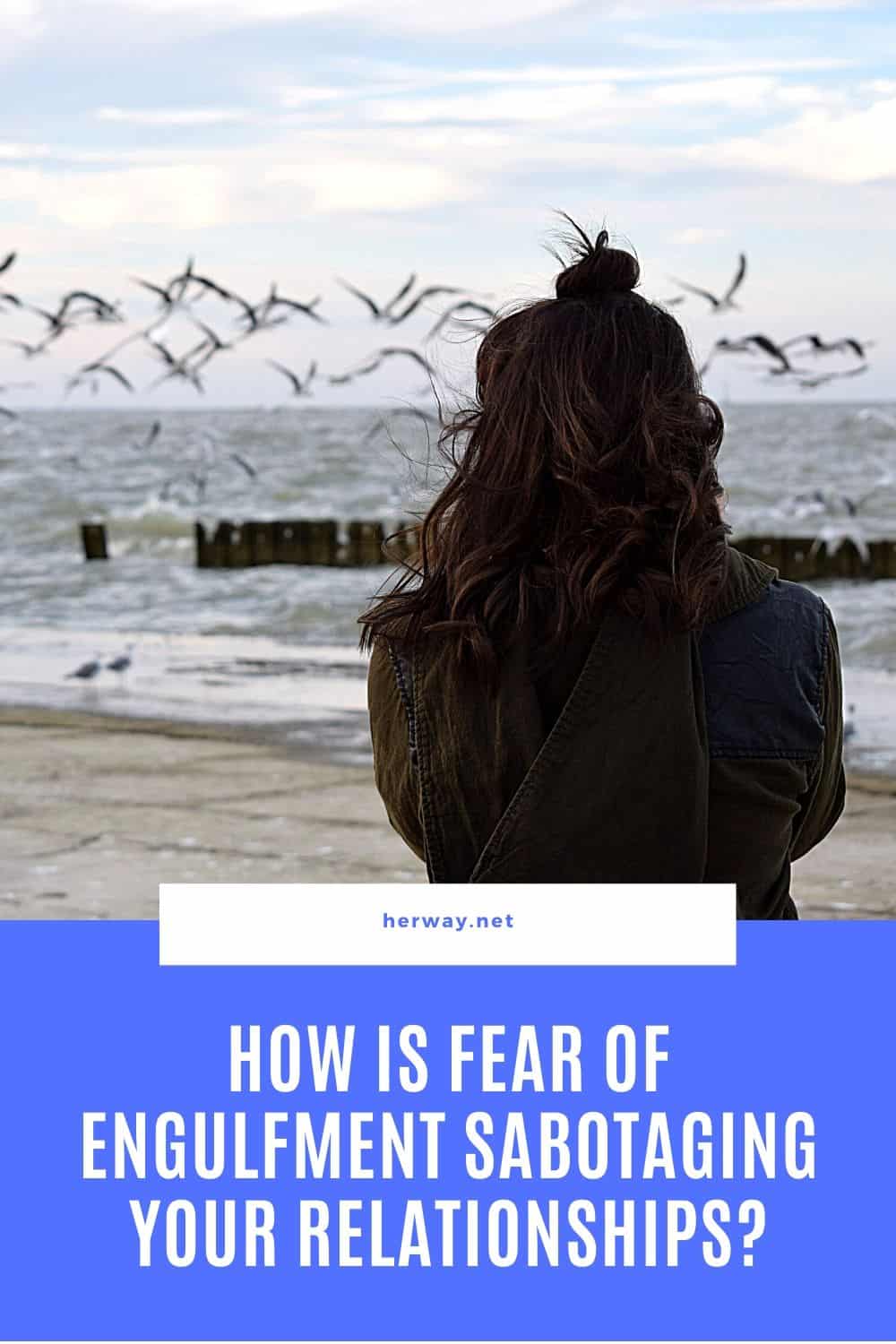How Is Fear Of Engulfment Sabotaging Your Relationships?
We live in a world filled with various fears. We have a fear of commitment, fear of intimacy, fear of rejection – and the one trending at the moment is fear of engulfment.
The term “engulfment” actually sounds like something powerful that can eat you up in a second and with minimum effort.
You don’t even need to know the real meaning of it in order to scare the living daylights out of you.
(Don’t worry, we won’t skip defining it.)
So, what is the fear of engulfment?
Basically, it is a fear of “losing yourself” in relationships where you’re being controlled or dominated, or you’ve become needy and demanding.
In other words, it is a fear of being “suffocated” by someone to the point where you feel like you’re no longer in touch with yourself.
This often happens unintentionally and the person is not even aware of it, well, until she becomes aware of it.
Also, many people mistake engulfment with love, but the truth is that it’s similar to limerence (being high on love).
You get addicted to it, so you don’t even notice it’s happening.
(Some) Examples Of Engulfment
Even though engulfment is primarily connected with intimate relationships, the truth is that it can occur anywhere from within groups to any type of relationship.
Here are some examples of engulfment to help you understand better the concept.
Joining a group or cult

You’ve probably heard lots of times about different cults and you may have even been a part of one, so you already know how things function there.
Members of a certain cult lose themselves to the leader and group as a whole.
They lose their own identity and become dependent on the group. Literally, they no longer know how to function alone because they get everything they need from the group and are in a way controlled by it.
Overprotective parents

Usually this one is about mothers because their connection with their children is so powerful even when they become legit adults.
Out of fear that something will happen to them and to protect them from all kinds of toxicity from the world, parents often become overprotective.
This overprotectiveness “suffocates” a child and doesn’t leave enough space for his or her healthy development.
Even though parents want the best for their kids, it’s still important to give them some space to make mistakes and learn from them. It’s the only way for a child to become independent.
Friendships

Some people have really strong charisma that can sometimes turn into controlling behavior. For example, imagine a hardcore introvert and an extrovert hanging out.
At some point, the introvert might start feeling dominated and controlled if the extrovert is the one choosing all of their activities, imposing his own opinions and beliefs on the introvert, and similar.
And that is when the introvert might start feeling engulfed by the extrovert. When you don’t have much space to express yourself, it is natural that you start feeling suffocated.
Workplace

Imagine it’s the first day of your new job and you feel overwhelmed by your boss thinking that he’s some kind of an alien creature.
But, as time progresses, you realize that he’s just like you and me and there’s nothing to be afraid of.
Just because some are in higher positions than you, it doesn’t mean you should feel engulfed by them.
It usually takes little time to realize that, however, so the engulfment phase doesn’t last for long (but it’s a worthy example nonetheless).
See also: 7 Signs You Have Philophobia – The Fear Of Falling In Love
Intimate relationships

And one of the most famous examples of engulfment fears is within intimate relationships. It’s when you just start dating and feel on cloud nine.
You want to spend all of your time with the other person (not only your free time) and when you’re not together, you fantasize about being with them.
Everything you see, say or do reminds you of them and you have this uncontrollable urge to do anything for them to make them happy.
And that’s actually normal, but ONLY in the beginning stages of a new relationship. When the honeymoon phase is over (usually around the 3-month mark), these intense feelings of infatuation should start to wane.
If they don’t, then you’re at high risk of becoming an engulfing partner. Healthy relationships are all about nourishing each other’s independence, your own friendships, hobbies, and similar.
When one partner becomes engulfing, they soon start showing fears of abandonment, which results in fear of commitment in future relationships.
Love vs. Engulfment

As already said, many people think that engulfment means experiencing love because we ought to lose ourselves in a relationship and spend as much time together as possible.
The reason many people think this is due to the media (especially those low budget romantic movies).
We all know the drill: Girl and boy like each other a lot but cannot be together for some reason. When they overcome all of the barriers, they end up with their happily ever after.
Boy would do anything for girl, even giving up his job only to support her hobbies. And she is ready to do the same for him.
While this looks overly cute to all of us on the other side of the screen, reality is somewhat different.
We get convinced that this is exactly what real love should look like and therefore implement that knowledge in real life.
But, the thing that they don’t show in the movies is how this romance would usually end up if it was realistically depicted.

They don’t tell you that spending too much time with your loved one will result in losing contact with others (friends and family) and losing touch with yourself.
Real-life adult relationships also go through stages of inner bonding, intense emotional intimacy, and spiritual growth.
But, the difference between love and engulfment is that people in healthy relationships don’t let themselves derive all their emotional needs just from their relationship.
In other words, they have a life outside the relationship and plenty of other people for support, hanging out and doing all those things that they were doing before they entered a relationship.
When one partner lets their self-esteem and self-worth greatly depend on their partner and when that person feels like this is how it should be, they enter the engulfment.
They develop abandonment fears because they can‘t imagine losing their partner, as this would also mean losing their self-esteem and essentially their entire world.
What Causes Engulfment?
There are many reasons why some are more prone to experiencing engulfment in relationships than others, and these are often connected with mental health, lack of love during childhood, and personality disorders:
Feeling lonely

Even though we’re virtually connected more than ever in this modern era, real-life connections have become a scarcity. It’s relatively easy for an individual to feel lonely even when surrounded by people.
If we’re not that close with our family and friends (or if we don’t have any), we experience severe loneliness, which in turn might cause engulfment in an intimate relationship.
We start to meet all our needs from our partner and separation anxiety becomes inevitable.
Low self-confidence

When we’re feeling unloved, we may have a hard time accepting the fact that we are worthy of love. So, when we finally meet someone who likes us, we perceive them as the most important person in our life.
We do that because they shower us with love and make us feel more confident about ourselves.
Our relationship becomes the source of our self-love and confidence, and that is how we lose ourselves sooner than we know.
Abandonment fear

If you have a fear of abandonment, you’re prepared to do anything not to lose that one person (be it your partner, friend, or someone else).
That relationship becomes your number one priority and because of that, you tend to neglect other things in your life.
The whole focus here is on abandonment fear that’s preventing you from reaching your full potential. Fears of abandonment and engulfment two fears that are interconnected.
Basically, you lose yourself because you’re afraid of losing the other person.
Feeling misunderstood

If you feel like no one understands you, including both your friends and family, and you finally meet that one person who sees the real you and brings out the best in you, they become the missing piece in your life puzzle.
You become engulfed because you’re overly happy about the fact that someone finally understands your fears, wishes, and how you operate.
You text them 24/7, you share every single thought with them (even the irrelevant ones), and you want to hang out only with them.
Hanging out with others is not as satisfying as it is with that one special person. And this feeling of intense worshipping might trigger the fear of abandonment as well.
Enmeshment trauma

This type of trauma occurs when a child is forced/required to put their parent’s needs before their own. This usually happens due to one parent’s physical or emotional absence.
When that happens, a child is forced to fit the role of an adult and take on lots of responsibilities. The child doesn’t have the freedom to be just a child like his or her peers.
The most common causes of enmeshment trauma are loss of one (or both) parents and physical or mental illness of a parent.
Emotional neglect

Some parents are physically available 24/7, but emotionally absent. When that happens, children start feeling emotionally neglected.
Since they don’t have a positive experience when it comes to emotional needs, they develop BPD (Borderline Personality Disorder).
Later in life, they start seeking emotional connection literally in everyone around them, and especially their partners.
They have a void that they try to fill with other people’s affection and often become dependent on their partners.
They experience their love as a substitute for the one they never received from their parents.
Physical abuse

If a person was physically abused, they might feel as if they’re not worthy of any type of affection and love from others. They start feeling unworthy of being loved and find it difficult to trust other people.
So, when they finally meet someone they do fully trust, they become engulfed. Out of fear that they will lose that person, they are focused on meeting their partner’s every need and literally doing anything for them.
Sexual abuse

Sexually abused individuals also have difficulties trusting others. They have a hard time establishing connections because they are afraid of getting hurt again. Also, they suffer from low self-esteem.
So, finding someone who is patient with them, understands what they’ve been through, and can meet their emotional needs results in engulfment.
Verbal abuse

The same thing can be applied to verbal abuse as well, only in a different context.
If you’ve been bullied at school or verbally abused by your family or close friends, this will reflect on your mental health and perception of yourself.
You will feel like you don’t deserve love and affection and because of that, you will always give more than 100% into every relationship.
When you feel like you’re not good enough, you start doing everything in your power to prove otherwise to both yourself and others.
6 Signs Of Engulfment
Feeling responsible for other people’s happiness

One of the biggest signs of engulfment is the feeling of being responsible for other people’s happiness. It’s when you’re constantly thinking about your next move and whether they will like what you’re going to do or say.
Also, you’re solely focused on meeting their every need, request, and wish because you feel it’s your job to make them happy. On a subconscious level, you know that if you make them happy, they won’t leave you.
Thinking that it’s selfish to put your own needs before others

Another sign of engulfment is thinking that it is selfish to put your own happiness before someone else’s. You’re convinced that self-care and meeting your own needs would be an act of the ultimate selfishness.
Other people’s happiness is your priority and you seldom or never ask yourself what it is that you really want from the relationship (be it romantic or platonic).
That mindset gets you stuck in dancing to other people’s tunes without even knowing it.
Feeling unworthy of love and perceiving it as something that needs to be deserved

Those individuals who lacked parental love during childhood are at higher risk of feeling unworthy of love and seeing it as something that needs to be earned later in life.
They don’t understand that unconditional love is something that should happen naturally and reciprocally.
Instead, they enter a relationship with a mindset that they need to do everything in their power to get the other person to like and adore them.
This stems from their tendency to do the same in order to earn love from their parents.
Thinking that others will abandon you if you don’t do what they want

Fear of abandonment is one of the most powerful forces in the world.
The person lives in constant fear that their partner or friend will abandon them if they don’t meet all their expectations and do exactly what they want.
So, they end up doing things they normally wouldn’t do only to avoid disappointing them and being abandoned.
And that is where they lose themselves. By constantly overthinking and trying to make other people happy, desired, and wanted, they neglect themselves.
Feeling like no one will like the real you
Another sign of engulfment is when you feel like no one will ever like the real you, so you tend to be something you’re not only to win their approval.
You think that the only time someone will like you is if you’re perfect in every aspect of your life – an impossible feat.
The real you also consist of quirks and flaws that need to be embraced instead of replaced with “perfection.” But engulfment fears prevent you from understanding this and seeing things rationally.
Feeling worthy only when others value you

When you lack self-love, you feel unworthy of other people’s attention and love. So, when others start showing you love and appreciation, you instantly feel more worthy.
For example, let’s say that you are great at drawing, but you don’t see it as something amazing. But, when other people value your work, you immediately start appreciating your talent.
This one is connected with seeking validation from other people. It’s when you think that only other people’s love can make you desirable and worthy.
Therapy

If your fear of engulfment is connected with past events, it is advisable that you seek a therapist who will help you cope with your fear.
When finding the right therapist, be sure that you feel comfortable with them, and that you trust them, because that’s the first step to being able to open up and deal with the fear.
Coping With Fear Of Engulfment
Regardless of whether or not you seek help from a therapist, there is some individual work that needs to be done if you want to successfully overcome the fear of engulfment.
Step 1: Accept the fact that every connection and relationship with another person is risky

You cannot know the outcome of your affection or what will happen in the future.
They might reciprocate now and shower you with affection, and then later become a completely different person. The key lies in knowing who you are and what you expect from the relationship, and being realistic.
You must nourish your self-worth and feel comfortable with yourself. This will help prevent you from entering the engulfment stage since you will be in touch with yourself.
So, whatever happens with the other person, it will not affect you to the extent of losing yourself.
Step 2: Reflect on your past

Evaluate your relationship with your parents during childhood to notice any possible neglect, lack of love, or abandonment.
Your past might be closely connected with your fears, so the sooner you target the root of the problem, the sooner you’ll be able to fix it.
Think about the things that should have been different in your parent-child relationship.
Usually, you don’t notice those things as a child, but as an adult, you now have a clear picture on how your childhood experience should have been.
Step 3: Listen to and correct your inner critic

Whenever you feel like you’re not worthy of love, you need to earn love, or you have a fear of abandonment, listen to your inner critic and try to figure out where this is coming from.
Question your thoughts and correct or shut up your inner critic, because you need to develop the loving adult part of you in order to function in other relationships.
When you develop a loving adult self, you won’t seek validation in other places and you won’t worry only about what the other person wants.
And remember: You can do it!
Yes, it will take time to master a healthy personal relationship comprising self-love and self-worth.
But, as always, if you stay persistent and determined, there’s not a single fear in the world that you can’t conquer, let alone fear of engulfment!
All you have to do is believe in yourself that you CAN, and you’re halfway there.
See also: 10 Ways To Successfully Overcome Your Fear Of Love








